There is a huge variety of careers in animal agriculture, and many of them are jobs you normally don’t even associate with this industry. Sure, people may immediate think of veterinarian as the staple profession, but when you study animal science, there is much more to the landscape than becoming a vet.
Being a part of animal agriculture means that you can choose to monitor and track animal wellness, work at barns or boarding facilities, specialize in dairy or meat products, or be involved in the greater supply chain.
Agriculture as a whole has a variety of professions, and animal ag as a sector is no exception. It has a bunch of interesting and unique careers that you can look into. Here are five of my favorite careers in animal agriculture that work directly with animals:
1. Animal Welfare Auditor
Animal welfare auditors perform welfare audits on farms and in animal processing facilities. Auditors conduct inspections to ensure that appropriate animal welfare guidelines and procedures are being followed. Typically, people in this position work for the government, animal production companies, food and restaurant companies, animal processing facilities or animal welfare organizations, and agencies that oversee or provide services to producers.
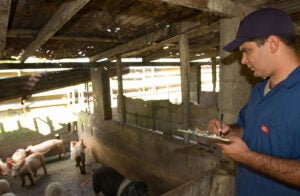
Depending on the facility that they’re visiting, auditors make sure that farmers or producers are following all legal and company standards about animal welfare, including things like animal handling, euthanasia, food safety, and other welfare topics. Auditors are also responsible for reporting and investigating any misconduct surrounding animal welfare. They also provide recommendations and training to producers on how to reduce animal stress, improve welfare, and even change policies to be even better in the future. Auditors can be certified through various programs.
2. Feedlot Manager
Feedlot managers are in charge of supervising and managing day to day operations at a feedlot, including things like herd nutrition, environmental conditions and the marketing of feedlot livestock. Managers also assist with mixing feed and feeding livestock, receiving and processing cattle, assessing herd health, doctoring animals and cleaning pens. They also ensure that all health, treatment and safety standards are followed.
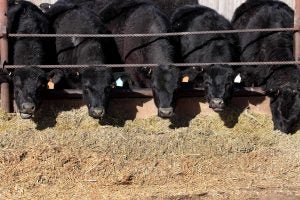
Feedlot managers do a little bit of everything, including repairing facilities, managing budgets, maintaining relationships with customers and suppliers, supervising staff, and ensure proper handling and care for feedlot animals. Some feedlots are owned and operated by the same person/people while other feedlot managers are hired.
3. Livestock Auctioneers
Auctioneers are the ultimate salespeople. Not only do they run auctions, they can help buyers select animals to purchase, organize sales, and more. Auctioneers also need skills in knowing desirable qualities of livestock so they know what to talk about and keeping track of prices and market trends all across the industry. Some auctioneers work for a sale barn or auction company, while others are self-employed or own their own business as an auctioneer. Many of them sell more than just livestock, including things like real estate or machinery. Some auctioneers operate out of one location (such as a sale barn), while others might do a mix of that and traveling to auctions hosted at a farm or ag operation.
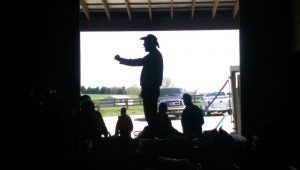
Auctioneers need to be good at selling whatever comes through the auction, all while spotting bids, declaring winners, and helping with a variety of other tasks. To be an auctioneer, many states require you to be licensed after attending an auctioneer school (yes, there’s schools just to become an auctioneer), but the entire process doesn’t take too long.
4. Carcass Merchandiser
A carcass merchandiser, also known as a meat merchandiser, sells and promotes the sale of animal carcasses (most often pork and beef) for meat. They work closely with livestock and meat graders (who accurately grade livestock and carcasses based on U.S. Department of Agriculture standards). Merchandisers work with customers (often companies) to source meat products while ensuring the deadlines and quantity requests are met. Carcass merchandisers often work for livestock production or processing companies.
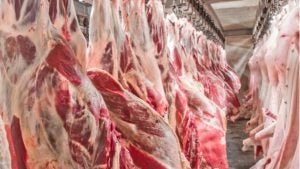
This job requires that merchandisers know USDA meat and carcass grading standards, their companies standards, how to evaluate carcasses, handle ordering, invoicing, and maintain contact and relationship with buyers and more. They also need to develop strategies on how to best sell a product based on its quality grade, yield grade, breed type, and other factors of the carcass.
5. Animal Physical Therapist
Animal physical therapists are exactly what the name sounds like, a person who rehabilitates and does physical therapy on animals. There are many variations on just this career, such as vets who specialize in equine sports medicine or general rehab for animals, animal massage therapists or chiropractors, and technicians who complete other therapies such as MagnaWave PEMF, laser therapy, ultrasound, and many more. Some of these specialties require a lot of school, like becoming a veterinarian or human therapist first, while others require independent schools or experience through internships and apprenticeships.
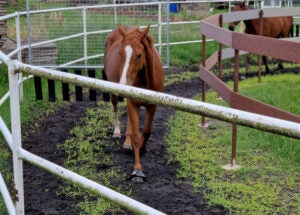
The main goal of anyone in this type of position is to give animals a better quality of life. The type of animals being treated also varies greatly. Some animals being treated are recovering from surgery or injuries, some are show animals or performance athletes, and sometimes (if a physical therapist does people too) the owner is being treated too! Many different species can be treated, ranging from pets, to horses, and even livestock and bucking bulls.
This was just a tiny look at a a couple of the unique jobs that make up the animal agriculture career path! And this was only the careers that work directly with animals or in the food system, not even including all of the interesting careers in communications, research, business, technology, science, and more that are also part of animal science. There are definitely a lot more to explore!
Michelle Miller, the Farm Babe, is a farmer, public speaker, and writer who has worked for years with row crops, beef cattle, and sheep. She believes education is key in bridging the gap between farmers and consumers.


